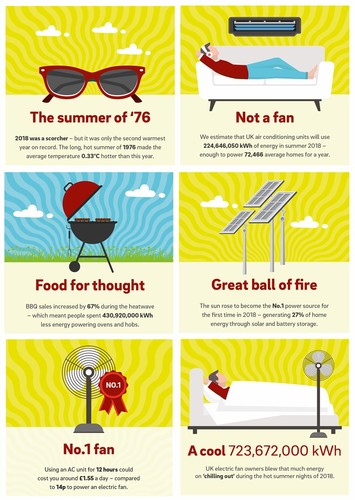How the 2018 summer heatwave impacted the nation’s energy use: The Summer in Stats
The Summer in Stats: How the 2018 summer heatwave impacted the nation’s energy use
E.ON looks back at how the 2018 summer(1) heatwave impacted the UK’s energy consumption.
This summer was constantly compared to the blistering heatwave of 1976 – in fact, it came so close that it was widely reported as the joint hottest summer since then.
Met Office data(2) reveals that 1976 was the hottest summer on average, though only by a small margin (0.33oC). Despite this, when looking at the average temperatures throughout June, July and August, 2018 still appears more frequently in the top three hottest months than 1976.
June 2018: 2nd hottest June on record
July 2018: 2nd hottest July on record
August 2018: 25th hottest August on record
June 1976: 3rd hottest June on record
July 1976: 5th hottest July on record
August 1976: 5th hottest August on record
Using this year's scorcher as an example, E.ON investigates how our behaviour during the summer heatwave impacted the nation’s energy consumption at home.
BBQs:
In July, John Lewis reported their sales of BBQs had increased by 67%(3). By barbecuing more than usual this summer, E.ON estimates that as a nation, we used 430,920,000 kWh less energy(4) than we would have if we used conventional hobs and ovens. This saves enough to power 130,006 average-sized homes for a year(5).
Electric Fans:
While our appetite for al fresco dining may have reduced our energy use, the cost of keeping cool this summer soared. Research reveals that internet searches for “fans” rose by 140% in 2018 and sales doubled compared to summer last year(3). What’s more, four in five fan owners(6) were found to switch it on at night, in the hope to keep cool and get some sleep.
By correlating demand with Met Office weather data, E.ON estimates(7) the total energy consumed by leaving fans on overnight this summer was 723,672,000 kWh. That’s equivalent to powering a whopping 233,443 homes with electricity for a year(5) (or the same as half the size of Cardiff(8)).
Fans are by far the more purse-friendly method of keeping cool though – depending on wattage, sleeping with your fan on every night for a week costs up to £0.98(9), whereas aircon could set you back £10.85(3) a week.
Being outdoors:
With the hot weather and lower than average rainfall(10) for the most part of summer, even those not actively looking to save money and energy likely did so by spending more time outdoors. A study found that 23% of us were encouraged by the hot weather to spend more on outdoor activities and experiences(11), getting away from televisions and games consoles at home.
For more information, visit the E.ON blog post, The Summer in Stats.
Having problems with this link? Try here: https://www.eonenergy.com/heatwave
Ends
Notes to editors
1. Mentions of ‘summer’ refers to the full months of June, July and August.
2. Source: Met Office
3. Source: The Times
4. Based on UK households overall having approximately 25.2m more BBQs this year compared to 2016.
5. Based on the average household’s annual electricity consumption of 3,100kwh (Source: OFGEM)
6. Source: Daily Express
7. Based on an approximate 8.7 million households with a 75watt fan on overnight for 12 hours throughout June, July and August.
8. 233,443 average-sized homes for a year. Cardiff contains approximately 440,200 households (Source: 2011 Census Data)
9. Source: The Sun
10. Source: Met Office rainfall information for June, July and August 2018.
11. Source: Barclaycard
For more information please contact:
Olivia Martin – olivia.martin@iprospect.com
The information (including any forecasts or projections) contained in this press release (the "Information") reflects the views and opinions of E.ON on the date of this press release. The Information is intended as a guide only and nothing contained within this press release is to be taken, or relied upon, as advice. E.ON makes no warranties, representations or undertakings about any of the Information (including, without limitation, any as to its quality, accuracy, completeness or fitness for any particular purpose) and E.ON accepts no liability whatsoever for any action or omission taken by you in relation to the Information. Any reliance you place on the Information is solely at your own risk. This press release is the property of E.ON and you may not copy, modify, publish, repost or distribute it without our permission. © E.ON 2018
